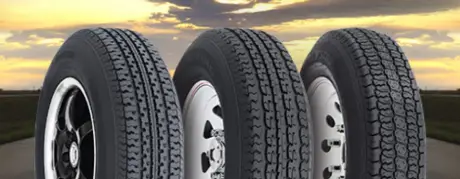
The requirements for trailer tires differ significantly from those for cars, mainly due to the long idle times between uses. When driving back from the hardware store with the wooden beams or on a camping trip with the fully packed caravan, the trailer tires then have to carry heavy loads. This change puts a lot of strain on the material, so you should check the tires regularly.
We have summarized the most important information about trailer tires and wheels for you in this article.
Which tires should I drive on my trailer?
As with other tires, the most important thing is the right size and, above all, the load and speed index. If you buy new tires for your trailer and you need tires for heavy loads, you should read the dimensions directly on the mounted tire so that the tire fits your rim.
The load and speed index can be found in the vehicle registration document. Here you can also find out whether you need a special type of tire heavy loads, such as C-tires. This can often be the case with larger types of trailers such as caravans. Check with the manufacturer, since the trailer tire and wheel choice depends entirely on your needs and intended use.
Trailer tires and service life
These are the things you should keep in mind. Before every journey and especially after long periods of non-use, check whether the rubber is still intact.
In order to protect the tire material, a dry and dark location is recommended - in any case, the tires should not be exposed to direct sunlight. If your parking lot does not allow this, you can protect the wheels with a cover.
Check the air pressure at least once a month to avoid damage to the stance and in any case before every trip especially if you use tires for heavy loads.
Tip: A rapid loss of air does not necessarily mean that the rubber has been damaged. It could also be corrosion on the rim bead or a leaking valve. It is best to discuss it directly with your car workshop if your tires lose air at an above-average rate.
Trailer tires and low profile
Don't worry if you get a trailer tire with a low profile. It is approximate and the lower tread depth has no effect on the longevity of the tires.
More and more manufacturers of trailer tires are relying on a low profile for their manufacture. This has to do with the new technologies and rubber compounds. The use of special components ensures that a higher profile is simply no longer required to produce a tire with high durability. Incidentally, the low starting profile ensures a better driving experience especially when tires are used for heavy loads—the tires feel less spongy and lie better on the road.
When do I have to change my trailer tires?
As with other tires, the following applies in principle: if the profile is too worn. The legal minimum profile depth is 1.6 mm. Regardless of the profile, you should always change trailer tires if you discover injuries or porous rubber.
Always replace trailer tires for each axle - i.e. both tires on one axle. This will prevent uneven wear and tear and reduce the risk of rolling.
Should I install winter tires on my trailer?
If you are traveling with your trailer especially in the warm season, summer tires make sense. On a camping trip on summer vacation or when removing green cuttings from your garden, you will hardly be confronted with snow.
For example, a horse trailer is heavy and is also moved in winter - winter tires make sense here. So always think about what you usually use the trailer for. Some manufacturers now also offer all-season tires for trailers. This is a good idea if you have your trailer out and about in any season.
Same articles

Understanding Vehicle Inspection and Verification Services: Why They Matter for Every Driver
GuidesVehicle inspection and verification services are an essential but often overlooked part of keeping roads safe and cars legally compliant. Most people only think about inspections when it’s...
KLIFEX Brand Overview: High-Quality Automotive Repair Kits for Affordable Repairs
GuidesThe automotive aftermarket has long needed solutions that combine reliability, durability, and affordability. Many car enthusiasts and services are looking for a way...
Fast, Reliable Vehicle Emissions & Inspection Services Made Simple
GuidesFast, reliable emissions and inspection services are essential for keeping vehicles road-ready, compliant with environmental regulations, and safe for daily driving. If you’re looking for quick...

